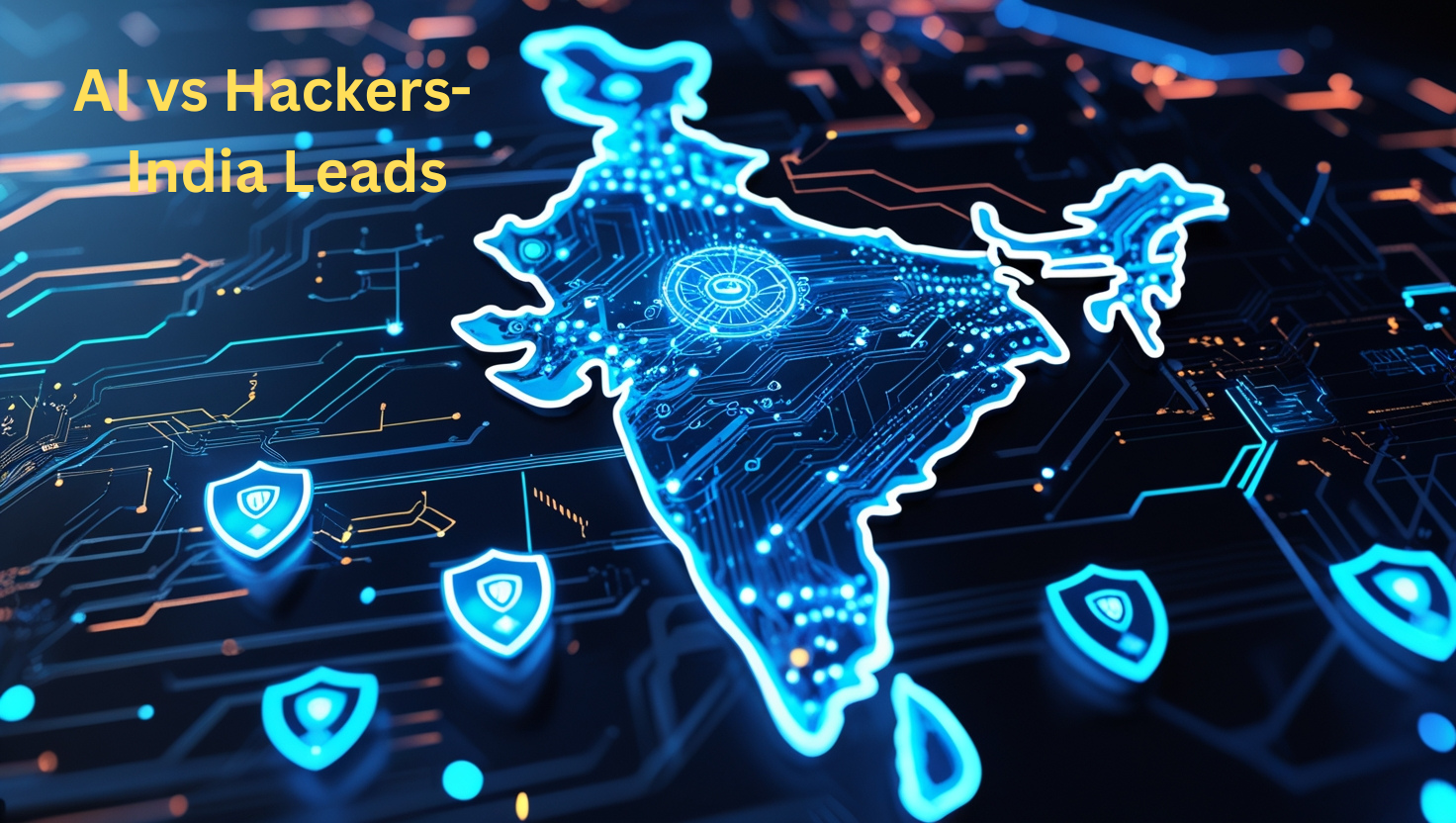If you’ve heard this one before, stop me.
Suddenly, as you’re looking through your phone, you receive a message that appears to be authentic—perhaps it’s a link from a friend or a message from your bank. However, you hesitate. Something doesn’t feel right. Is this the beginning of a scam? Yes, it could be a scam as scammers nowadays go beyond simple phishing attempts. They use generative AI to build synthetic logos, replicate well-known voices, and send messages that are timed to throw you off balance. In the hands of cybercriminals, that is the real power of AI. Attacks are becoming quicker and more realistic as a result. The intriguing aspect, though, is that India is leading the world in generative AI defence against these attacks. Indeed, you are able to participate in that defence and can contribute to the India’s Cybersecurity landscape.
The Threat Is Real—and Escalating Fast

Cybercrime isn’t a future problem; it’s happening right now, all around us.
1]AI-Powered Smarter Scams:
Consider a fraudulent call that sounds exactly like a member of your family. Or an email that appears to be from your bank, including your recent transaction history, but actually takes your identity from social media. All of these are powered by AI. Scammers no longer write unpleasant emails; instead, they create communications that are so smooth that they go past your natural suspicion.
2] Ransomware that is automated:
Ransomware no longer waits for human operators to initiate attacks. AI is able to automatically find servers that are at risk, customise payloads, and launch them to thousands of computers simultaneously. This implies that a breach can spread more quickly than in the past.
3] Incident Response Automation:
AI may take swift action when it detects a suspect activity, suspending user accounts, quarantining compromised computers, and alerting security teams in a matter of minutes or even seconds. This quick response could mean the difference between a large breach and a confined incident
4] Analytics for Prediction:
AI can forecast which assets are most likely to be targeted next by utilising machine learning models and historical attack data. By doing this, security professionals may proactively patch weak systems and seal holes before hackers take advantage of them.
5] Testing Adversarial AI:
In order to identify vulnerabilities before actual attackers do, some Indian cyber teams are even employing AI to attack their own systems through red-team exercises and simulations.
A Career in Cybersecurity Is Within Reach

You might be thinking: “This sounds techy. I’m not a data-scientist or programmer.”
Here’s the truth:
cybersecurity needs curious people more than code-writers.
You don’t need to be an AI expert: You don’t need to write ML algorithms or train neural networks. You need to understand how these tools work, how to interpret their alerts, and how to build security policies around them.
The following job kinds are available:
- Threat Analyst: This position involves analysing risks identified by AI tools, looking into questionable activity, tracing attacks back to their origin, and making mitigating recommendations.
- Cyber Incident Responder: You coordinate the reaction to attack warnings by tracking down the breach, isolating systems, preserving evidence, and reporting results.
- Security Architect: You balance usability and security when designing systems with AI tools.
- AI Auditor for Cybersecurity: You verify that AI tools are impartial, efficient, and compliant with privacy regulations.
- Digital Forensics Investigator: Analyse logs, rebuild digital traces, and determine whether an AI tool behaved appropriately during an incident.
What you’ll need to begin:

1. Fundamental understanding Know the fundamentals of cybersecurity, including system vulnerabilities, networking, and encryption. Digived, NASSCOM, Google, IBM, Udemy, and Coursera all offer these courses.
2. Important certifications: CEH, CompTIA Security+ certification, Certified Cloud Security Professional (CCSP) by the EC Council
3. AI tools and Gen AI: Investigate TensorFlow, PyTorch, and OpenAI tools to learn about threat detection.
4. Attend live AI cybersecurity seminars or labs hosted by AWS India or CERT-In.
5. Strengthen your superpowers that aren’t technical: Critical thinking and Curiosity.
also read: CEH ethical hacking course in Bengaluru
Success Stories from India

Anu Sharma, a commerce graduate, took a 6‑month cybersecurity diploma, picked up Python basics, and now works as a Threat Analyst at a Pune-based fintech startup. She uses AI dashboards to detect fraud—she’s also upskilling in cloud security this year.
Raj Patel, an MBA graduate, joined a public sector unit to manage cybersecurity policy. He spearheaded an AI‑backed phishing detection program that reduced phishing incidents by 30% in 2024.
Lingual Labs, a Bengaluru startup, used AI to build a chatbot that simulates phishing calls to train employees. The company now uses that platform to help other firms “stress test” their workforce.
These examples show that diverse backgrounds can succeed—from engineering and commerce to humanities and business.
Start Taking Action Today

Curious? Good. You’ve already taken your first step.
Here’s how to move forward—right now:
Step 1: Get Certified
Try a free build-your-path course like Google’s Cybersecurity Certificate, then aim for CompTIA Security+ or EC-Council CEH. Digived and other top institutes in Bengaluru offer the training programme for Certified ethical hacker (CEH) certification. checkout Digived’s CEH certification program.
Step 2: Join Communities
Subscribe to CERT-In updates. Follow cybersecurity thought leaders on LinkedIn and Twitter. Join local Meetups or bug bounty programmes like HackerOne.
Step 3: Practise Hands-On
Use virtual labs like TryHackMe, Hack The Box, or RangeForce. Do platform challenges on secure coding, phishing identification, or network intrusion.
Step 4: Learn AI Basics
Complete free or low-cost intro courses in ML/AI and security applications on Coursera or EdX. Explore toolkits like OpenAI’s Security Foundation Models and TensorFlow’s intrusion-detection modules.
Step 5: Build a Portfolio
Create projects like:
- A GitHub repo that analyses logs for threats.
- A training setup demonstrating how AI flags phishing.
- A write-up summarising how AI influenced decisions.
These show employers your interest and ability.
The Future of AI in Cybersecurity

What’s coming next—beyond where we are today?
- Generative AI Phishing 2.0: Smarter, deeper contextual scams. Defence must evolve just as fast.
- Zero‑trust AI architectures: Systems that assume no one’s trusted—even inside—until verified. AI will help verify continuously.
- AI-Augmented Threat Hunting: Security analysts working side by side with AI “assistants” who suggest queries, anomalies, and next steps.
- Ethical and Privacy Compliance: As AI tools advance, ensuring they respect data rights is critical. That opens roles in AI governance and policy development.
Final thoughts: Be the Change-Agent

AI-powered cybersecurity is no longer a science-fiction dream. It’s here now—and it’s crucial. India is at the centre of this digital arms race, but it needs more defenders—people like you. Imagine working on an incident response team that prevents a large-scale fraud. Or analysing AI-generated attack signals to protect a startup’s customer data. That could be your story.
“Cybersecurity isn’t just the future—it’s your opportunity to shape it. Start learning now and help defend a digital India”
If you’re looking forward to learn AI Integrated Cybersecurity from one of the best institutes in Bengaluru with better placements, we are here to help you. Visit Digived Academy to learn more about our Cybersecurity Training programs and start your journey as cybersecurity professional today.
also read : Digived cybersecurity course in Bengaluru with placement support
Frequently asked questions (FAQs):
- Is cybersecurity a good career in India?
Very much so. India has a huge talent gap—especially in AI-powered defence. Demand is growing in fintech, government, telecom, and healthcare. - Do I need to be highly technical to start a career in cybersecurity?
No—you just need digital savviness, problem-solving skills, and a willingness to learn. You don’t have to be an AI model‑machine. - How exactly is AI used in cybersecurity?
AI helps detect unusual activities, learn normal patterns, automate incident response, and even predict future threats with predictive analytics. - What’s the first step to starting in cybersecurity?
Start with a foundation—CompTIA Security+, Google Cybersecurity Certificate, or a relevant diploma. Simultaneously, experiment with hands-on labs. - Why is India leading in AI cybersecurity?
Because we combine a vast digital-first economy with strong government support, innovative start-ups, and talent upskilling. That mix drives global leadership.
Contact Us
For more information about our courses, schedules, and enrolment process, visit our website or contact us at.
Website: www.digived.academy
Email: admission@digived.academy
Phone: +91-9019299971



